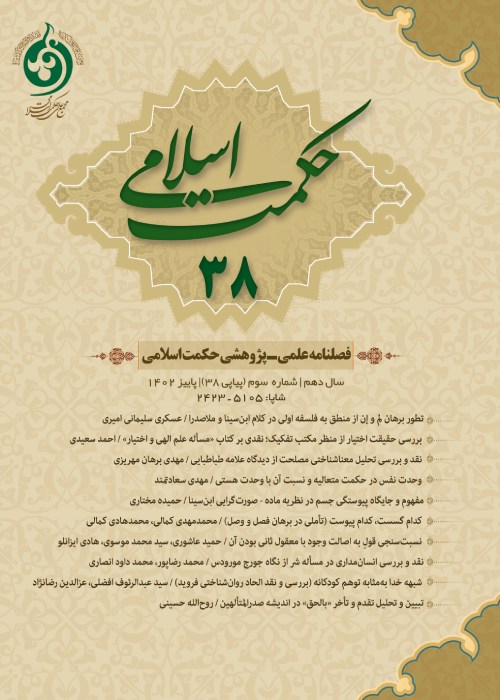Bodily resurrection from the viewpoint of Allama Muhammad Husain Gharavi Isfahani
Author(s):
Abstract:
How to explain bodily resurrection has long been among difficult issues of religious belief, with some denying and others approving of it. The psychological principles each adopted paved the ground for its divergence with the other, bringing about thus a variety of opinions. Sadrian philosophy explains bodily resurrection on the basis of the principles that are in harmony with religious texts. Assuming that his project of 'a body moving towards soul' was a new one, Agha Ali presented a new theory of bodily resurrection. Though his theory was not accepted by many, some welcomed it, one among whom was Allama Muhammad Husain Gharawi Isfahani, who in a short treatise revived his master's theory with the inspiration he took from transcendental philosophy. This short treatise is important because it explains Agha Ali's theory with much precision and less ambiguity. His fundamental principles are grounded on Sadrian thoughts whereas his approaches are in line with those of his master, Agha Ali. A combination of adherence to transcendental principles and a support for theological opinions gave rise [in his philosophy] to a new methodology for processing bodily resurrection.
Keywords:
Language:
Persian
Published:
Hikmat - e - Islami, Volume:3 Issue: 10, 2016
Pages:
131 to 154
magiran.com/p1673219
دانلود و مطالعه متن این مقاله با یکی از روشهای زیر امکان پذیر است:
اشتراک شخصی
با عضویت و پرداخت آنلاین حق اشتراک یکساله به مبلغ 1,390,000ريال میتوانید 70 عنوان مطلب دانلود کنید!
اشتراک سازمانی
به کتابخانه دانشگاه یا محل کار خود پیشنهاد کنید تا اشتراک سازمانی این پایگاه را برای دسترسی نامحدود همه کاربران به متن مطالب تهیه نمایند!
توجه!
- حق عضویت دریافتی صرف حمایت از نشریات عضو و نگهداری، تکمیل و توسعه مگیران میشود.
- پرداخت حق اشتراک و دانلود مقالات اجازه بازنشر آن در سایر رسانههای چاپی و دیجیتال را به کاربر نمیدهد.
In order to view content subscription is required
Personal subscription
Subscribe magiran.com for 70 € euros via PayPal and download 70 articles during a year.
Organization subscription
Please contact us to subscribe your university or library for unlimited access!



